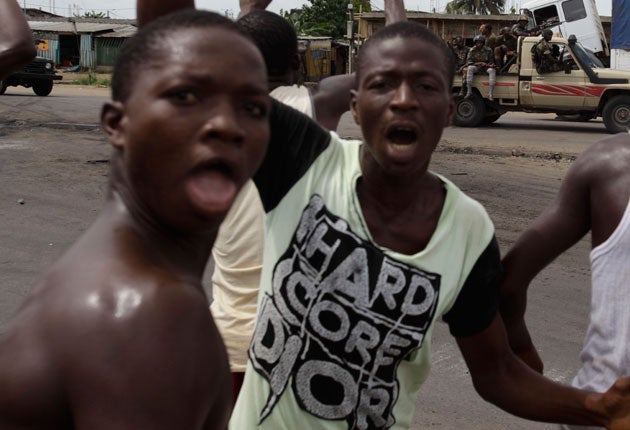Fears that putting Gbagbo on trial for war crimes will reignite the conflict

Your support helps us to tell the story
From reproductive rights to climate change to Big Tech, The Independent is on the ground when the story is developing. Whether it's investigating the financials of Elon Musk's pro-Trump PAC or producing our latest documentary, 'The A Word', which shines a light on the American women fighting for reproductive rights, we know how important it is to parse out the facts from the messaging.
At such a critical moment in US history, we need reporters on the ground. Your donation allows us to keep sending journalists to speak to both sides of the story.
The Independent is trusted by Americans across the entire political spectrum. And unlike many other quality news outlets, we choose not to lock Americans out of our reporting and analysis with paywalls. We believe quality journalism should be available to everyone, paid for by those who can afford it.
Your support makes all the difference.The International Criminal Court (ICC) is poised to investigate Laurent Gbagbo over alleged war crimes committed during the Ivory Coast conflict but a prosecution is unlikely to heal the strife-torn country's wounds, experts warned yesterday.
Mr Gbagbo is accused of complicity in rape, massacres and the deliberate targeting of civilians during the post-election stand-off in which at least 400 Ivorians have been killed.
Incarceration at The Hague would mean a third spell behind bars for Mr Gbagbo, the former history lecturer, who was imprisoned twice for political agitation before coming to power in 2000. The ICC is focusing on the death of seven women protesters who were shot dead in Abidjan's northern Abobo district last month, allegedly by soldiers loyal to Mr Gbagbo.
Fatou Bensouda, the ICC's deputy prosecutor, said: "Any attack against unarmed civilians would be a crime under ICC jurisdiction. We have enough information to initiate prosecution against Laurent Gbagbo."
Mr Gbagbo, who stoked up divisions with the Muslim-dominated north, is accused of having sanctioned arbitrary executions, rape and the bombardment of civilians since his refusal to accept the result of last November's elections.
The ICC can prosecute individuals for crimes against humanity, following a referral by the UN Security Council, a signatory state or at the prosecutor's own initiative. However Alassane Ouattara is equally culpable for outrages, according to Human Rights Watch, which accuses his forces of killing hundreds of civilians. There are reports that allies of Mr Ouattara were responsible for the massacre of between 800 and 1,000 civilians at Duekoue in the west of the country.
Geoffrey Robertson QC, a human rights lawyer, said: "Gbagbo isn't a Gaddafi but he could be prosecuted for war crimes for attacking UN forces." He added: "It would be ironic if Mr Ouattara, at his moment of victory, were to be found criminally responsible for his troops raping and murdering their way to Abidjan."
Kwesi Aning, head of research at the Kofi Annan International Peacekeeping Centre in Ghana, said: "Mr Gbagbo must answer charges. This is one case where African leaders will be in agreement that one of their own members has behaved in ways that need to be sanctioned in international courts."
However, Martin Roberts, Africa analyst for IHS Global Insight, said: "According to the UN-certified results, 46 per cent of the population voted for Gbagbo. The opposition have made it very clear that they want him to go on trial but that could prove very divisive." Robert Besseling of Exclusive Analysis also warned: "The pro-Gbagbo camp is an established collection of militias united by ethnic, geographic or religious affiliation. There are segments of the military that are still loyal in Abidjan. The most likely outcome of Gbagbo's detention is a transfer to The Hague, and the publicity that will generate will tend to aggravate the whole conflict again."
People interviewed by Human Rights Watch described how pro-Ouattara forces "summarily executed and raped perceived Gbagbo supporters in their homes, as they worked in the fields, as they fled, or as they tried to hide in the bush".
Join our commenting forum
Join thought-provoking conversations, follow other Independent readers and see their replies
Comments